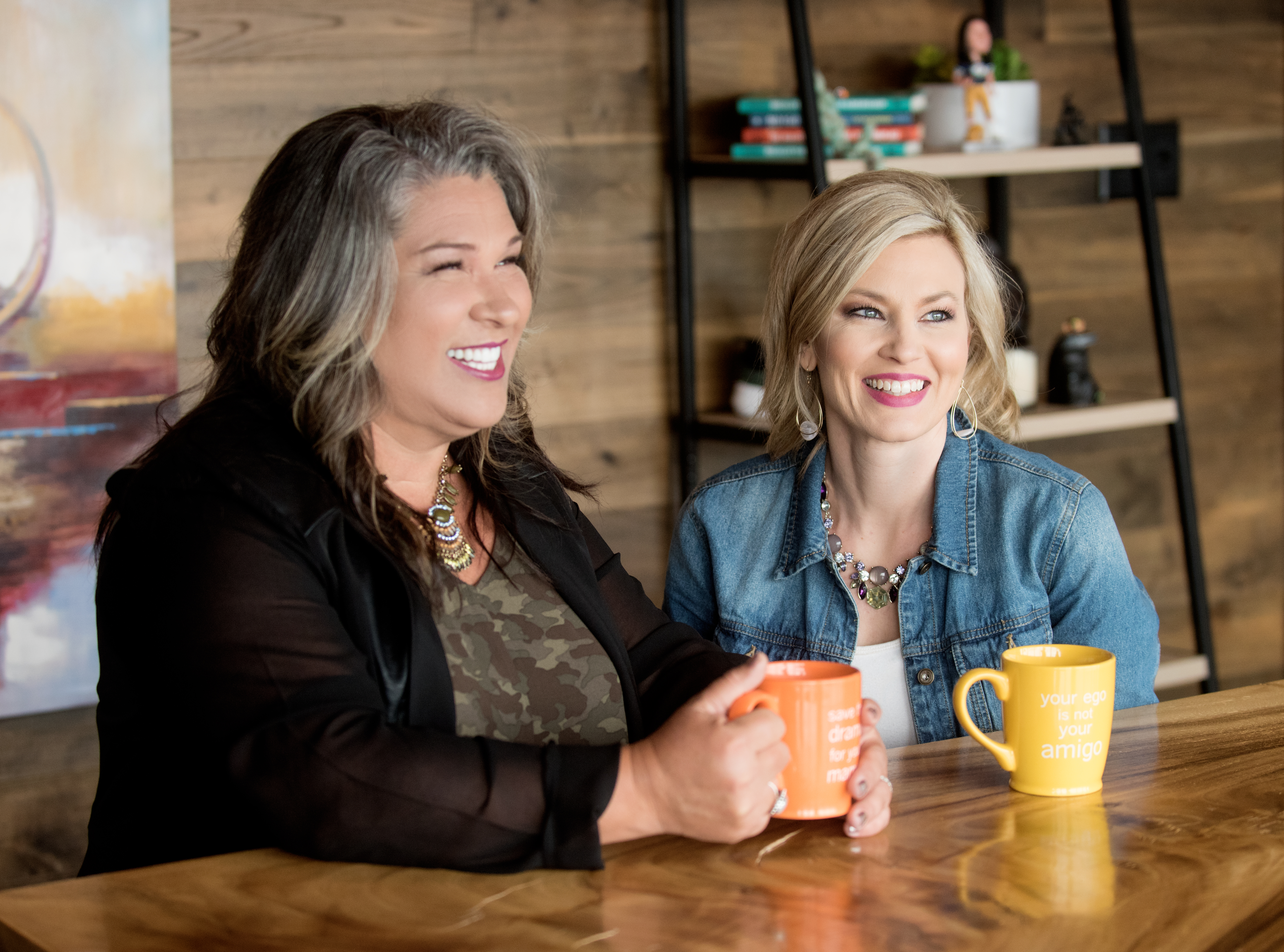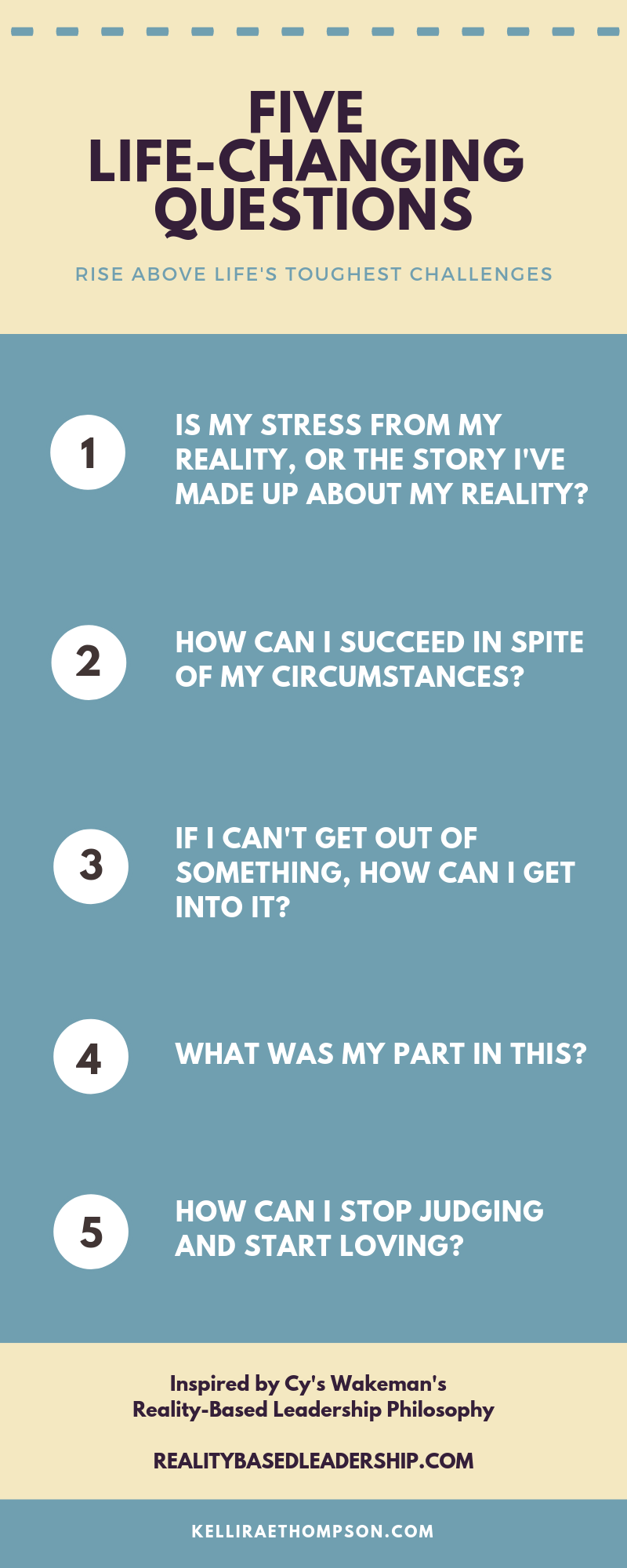Since 2016, I’ve had the privilege of working for New York Times Bestselling Author, Drama Researcher and Keynote Speaker, Cy Wakeman. I met Cy when I was a young, immature, 20-something professional in 2006. At work, I was assigned to help this relatively unknown (at the time) thought leader. I wasn’t prepared to meet a mentor who would rock my whole mind and world view with a new way of thinking.
Thirteen years later, the Reality-Based Leadership philosophy Cy taught me during that training project continues to provide me with brilliant wisdom at the perfect time. I’ve been so grateful to share these pieces of wisdom with my clients, in my writing, my speaking, and in my everyday interactions. I’m going to share them with you, too.
In 13 years of living this philosophy, here are my top five life-changing learnings and transformational questions. These principles won’t just help your peace and sanity at work, they can transform your personal life, too.

Is my stress from my reality, or the story I’m making up about my reality?
It all started with a story like this one. “My boss is demanding that the project be turned around in 48 hours. She has no idea how much stuff we have to do, and if she just knew what our project load was like, she wouldn’t ask us these things. This is just crazy, and she didn’t even consult us.”
After sharing this rant in a group activity, Cy told us, “It is not the reality that’s causing you stress. It is the story that you’ve made up about reality that’s causing you stress.” What a mind-blowing moment. I had never even thought about what I was thinking about. My eyes opened to the fact that many of the things that were causing stress in my life weren’t even real and I could change it. I had the power to change it simply by changing my words, by changing my thoughts, by focusing on the facts. What do I know to be absolutely true?
Cy taught me how to edit my story down to the facts. That demanding and uncaring boss simply just becomes a leader who needs some information due by 4:00 PM on Friday. Finding neutral ground empowers us, defuses stress and releases tension.
Every time I felt that (self-imposed) suffering arise, I was empowered to ask, “Am I stressed from my reality? Or, the story that I’m making up from my reality?” Getting neutral helped me reduce so much stress, not just at work, but only every day when I got in my car to go to work, to come home, to sit at the dinner table, to help with homework with my child, or just to have any sort of conversation with the general public.
How can I succeed in spite of my circumstances?
After one of my first promotions, I recognized some harsh realities, which continues to be true in only every workplace I encounter. I found myself working for a boss that preferred to communicate differently than I did. I worked for department that didn’t have a strategy as clear as I thought it should be. I was working in a new team with technology that wasn’t as good as I thought it should be. There were silos, too many meetings and people were swerving into each other’s swim lanes. However, those weren’t problems, they were simply – reality. The reality was we were a new department with many things to figure out, but I had to be careful not to wish for perfect circumstances like a perfect boss with a perfect strategy, and perfect email communication, and perfect technology. If everything were perfect, where would I add value? Cy taught me, I added value in imperfect circumstances. Every time I grew frustrated when I had imperfect circumstances, which is pretty much everywhere we go (restaurant lines, traffic jams, screaming toddlers, etc), I could recall this amazing one liner, “Your circumstances aren’t the reasons you can’t succeed. They are the reality in which you must succeed.”
Every time I grew frustrated with my imperfect circumstances, whether I’m at work or I’m at home, I learned to ask, “How can I succeed in spite of my circumstances?” My circumstances actually grant me a tremendous amount of power add value and use like my skills, my talents, and my abilities. Imperfect circumstances don’t take my power away, they give power to my abilities. And they changed my mindset from “victim” to “empowered.”
Imperfect circumstances give power to our talents.
Kelli Thompson
If I can’t get out of something, how can I get into it?
I had just earned a promotion from HR Training into the Marketing field. I was thrilled about this opportunity to be creative, but to my surprise, my boss delegated a technical writing project to me. I thought to myself, “I’m not a technical writer. How dare they ask me to write technical things. That’s not the job I signed up for.” Whoa – ego at play! I used hope as my strategy that if I just ignored this project long enough, if I just procrastinated long enough, then my leaders would have this spiritual dawning that I was not the person they should give this project to and they should delegate it to someone else.
Except that didn’t happen. I got called into my boss’ office for a status update. To be honest, the only update I could silently think of was, “Well I’ve been using hope as my strategy that this project will go away.” I received a call to greatness in that moment, and that’s to put it kindly, to deliver a plan to get the project on track.
That’s when a third piece of wisdom from Cy saved me again. “There are really just two ways to go through life, joy or misery, your choice.” There is no third option to stay and sabotage, stay and resist. That’s exactly what I was doing – staying and resisting. I was the one driving home every day in anguish and in stress, wishing this project would go away.
Luckily, I remembered something else that Cy told me, “If you can’t get out of something, how can you get into it?” All of this project dread and drudgery was my choice, so what could bring joy was changing my mindset to, “What can I learn from this assignment? How can I make this the funnest project I never wanted to do?” So, I got all in, I got to know the team, I learned everything I could. The universe is so wise. The skills I built were priceless experience for a future career move I made to a technology company.
What Was My Part In It?
The Reality-Based Philosophy is a mindset that exists beyond work which is helpful because I was in a moment where life hit me pretty hard. I was on the other end of some failed relationships. I’d catch myself asking, “Why does this always happen to me? Why can’t I pick relationships that are healthy for me? What’s wrong with me? Why is my “picker” broken? I was feeling like the victim of the outcomes of many of my relationships.
Thankfully, some wisdom met me in this rock bottom moment. Cy often says, “You have drama in your life because you hire it (for your personal life, it’s because you attract it) you tolerate it, or you are it. There was one common denominator in my relationship problems. And that was me. I mustered the strength to face a very difficult truth and ask, “What was my part in that?” The reality is, I was in my situation because I played a part in it.
That question counterintuitively became incredibly empowering. Why? Because sitting in any rock bottom moment, I can account for how I attracted it, how I tolerated it, and how I was it. A-ha! If I could account for how I got into my mess, I could get myself out of it.
I learned that I attract what I respect. The thing I was respecting at that time was a heck of a lot of drama. When I can change what I respect, I can change what I attract. That gave me the power to choose new relationships, social circles, hobbies and even careers.
When I can change what I respect, I can change what I attract.
Kelli Thompson
How can I stop judging and start loving?
Transparently, I am still working on this one and luckily I get practice every day. One of Cy’s favorite mantras is, stop judging, start helping. Just like you can’t listen to two radio stations at once, you can’t be judging someone and helping, leading, or loving them at the same time. I am learning to ask, “How can I stop judging and start loving?”
A cousin of this is, “How can I set aside my need to be right?” I debate too often because I think I’m right. More simply stated, I like to win arguments. I like to have the last word. I enjoy that little mental satisfaction of discovering I was right about something. But, when I work harder to be right than I work for the happiness of my relationships, or the success of a project, then I’m just sitting in judgment of others. I’m filled with pride and judgment by thinking, “Why can’t you get your stuff together? You aren’t thinking about this the right way. Your thinking is flawed.” I might not be verbalizing my thoughts, but internally in my heart I’m judging. Judgment of others separates us more than it unites us.
It’s hard to create healthy, unified relationships when I’m judging and keeping a loved one at arm’s length. My harsh thoughts keep me from inviting them in. Additionally, if I wanted to attract better things in my life, I needed to stop judging everything, beginning first with the harsh judgment I have for myself. I can spend too much time judging myself, my own imperfections, my perceived lack of qualifications, or worth of what I’ve been called to do. Self-judgments don’t stay hidden, they are revealed because they project onto others. When I’m busy judging myself, I have no room to love myself. If I can’t have love and compassion for my own imperfect self, it’s really hard to extend love and compassion for only everybody else on this planet that’s pretty imperfect.
That doesn’t mean I let everybody cross my boundaries. You can hold healthy boundaries and have healthy relationships. I can set healthy boundaries by saying, “Hey, here’s what I allow in my life. This is what I respect and what I’m happy to tolerate.”
There are still things I’m working on and I am absolutely not perfect. That’s why this philosophy is amazing because every day we show up in the human condition, and only every day we fail at it. But these statements and powerful questions give us the benefit of never needing to change anyone else. They serve as a way to reflect on my own mindset so I can find more peace in my life. When I can ask these questions, I am empowered to shift my thinking, and thus, move through the world more freely with less chaos.
“Imagine the power that you would have if you could walk through the world without ever needing to change anybody or anything. What could you accomplish?”
Cy Wakeman
Thanks for reading, friends. Now that I’m turning my focus to full-time leadership coaching, I can’t wait to share more exciting things I’m working on with you.

Follow us here and subscribe here for all the latest news on how you can keep Thriving.
Stay up to date or catch-up on all our podcasts with Arianna Huffington here.


